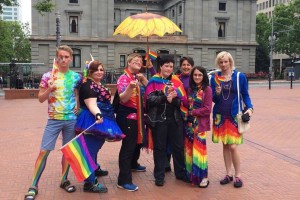When Jeanne St. John moved to Lincoln County, OR from the Bay Area in 1990 the culture shock was overwhelming; “It was stunning—like a time warp, but in a bad way.”
She and her partner went from being out and open to being closeted. Many people in their new town assumed they were just friends and roommates—not a couple. As school administrators, they thought that being open might distract people from the important work they were doing in the schools along Oregon’s central coast.
An important part of who they are remained invisible for more than 15 years, until they both retired.
When domestic partnerships for LGBTQ people became legal in Oregon in 2008, Jeanne and her partner were among the first to register. The local newspaper reached out, asking to write an article on their lives together and what this legal change meant to them. Their response was a resounding “hell yes!”
When the feature article about Jeanne and her partner came out, so did they—finally. The response from their community was supportive, and displayed to Jeanne the power of coming out (again). She said it was extremely liberating, and that she “hadn’t realized how important it was to her to be visible, especially as older women.”
Coming out to her community galvanized Jeanne. When a boy who was gay at Newport High School committed suicide, she dedicated herself to working with her community to make sure it was safe for everyone to come out. Part of this process was founding the Oregon Central Coast PFLAG chapter (OCC PFLAG) in 2008, which quickly became the umbrella organization for anything LGBTQ-related in Oregon’s rural coastal communities.
Ineka Estabrook became co-chair of Oregon Central Coast PFLAG with Jeanne in 2013 to help support her daughter (who is gay) and her community. Like Jeanne, Ineka’s 13-year old daughter came out to her community by being featured on the front page of the local newspaper after giving a presentation on bullying to the county commission.
Ineka says that her daughter “never wanted to hide and has never been in the closet.” While she did experience some challenges at school as a result of the article, she also found that many in her community were supportive. Her girlfriend however has not been so lucky—she is part of a fundamentalist church, and hasn’t come out to her community there because she knows she will be condemned.
Despite the relatively positive coming out experiences of Jeanne and Ineka’s daughter, life for LGBTQ youth, adults, and elders on Oregon’s coast is not easy. The social and support services in that area are extremely sparse because of the limited number of people.
There aren’t many organized groups, and those that have been successful have gone under as people have moved away. To attend LGBTQ events, people have to drive hours to bigger cities, or find out by word of mouth about the small, informal, and infrequent gatherings that sometimes happen along the coast.
Ineka describes the cultural climate within many of these communities as having “silent and underlying homophobia.” She identified the fundamentalist churches as being a key source of negativity, particularly in the smaller towns where support is much more minimal. OCC PFLAG tries to fill in the gaps in services and support communities through offering various resources to parents, potlucks for LGBTQ elders, and coffee meet-ups for LGBTQ folks of all ages. But OCC PFLAG has particularly focused on youth—“making sure they get out of high school alive.”
Ineka shared that “a lot of our kids have tried to commit suicide—there have been several attempts, and this is now OCC PFLAG’s main focus.” But the organization can’t reach kids who aren’t out to their parents, or whose parents won’t let them be involved; and those are the kids that Ineka says need them the most. “Many are not out to their parents and they don’t feel safe.” They have made inroads at the two bigger high schools in the area, but the three smaller high schools haven’t been as responsive and students at those schools are likely the most isolated, and most in need of support.
To address this challenging reality, Pride Foundation recently awarded a grant to OCC PFLAG for their Upstander not Bystander Bully Prevention Project, which will help fund bullying prevention programs at two additional Lincoln County schools. The grant will also support the county’s Youth Leadership Project, which trains 50 high school students in conflict resolution, drug and alcohol abuse prevention, and bully prevention/positive communication.
Through programs like these, OCC PFLAG continues to work towards building loving and supportive families and communities. While there is still much work to be done to shift the challenging reality for LGBTQ youth and adults living in this area, “OCC PFLAG has made real progress in changing attitudes on the rural Oregon Coast,” said Jeanne. “Six years ago there was only one welcoming and affirming church and now there are ten because PFLAG reached out and encouraged churches to go through the study process to become officially welcoming to LGBT people. Through OCC PFLAG’s efforts, there is also much greater awareness and support in the larger community about LGBT issues, including great support for marriage equality.”
LGBTQ people should be able to live safely and openly, regardless of their zip code. We know that this means making sure we reach the most invisible and vulnerable communities in our region, like those on Oregon’s coast. We will continue to support organizations like OCC PFLAG until everyone can be who they are, where they are.
Katie Carter is Pride Foundation’s regional development organizer in Oregon. Email Katie.
